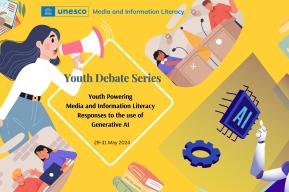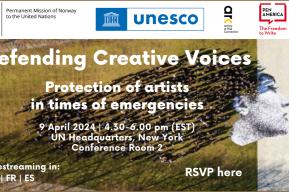Article
Piloting Media and Information Literacy in formal education in Albania: the first phase finalized

“The piloting of Media and Information Literacy skills (MIL) in formal education in 2021 has been a great example of reinforced cooperation between all stakeholders involved in this process in Albania. We can firmly say that we are leaving behind a phase of ad hoc projects and methodologies by adopting a systematic joint approach and a long-term vision,” said Remzi Lani, Executive Director of the Albanian Media Institute.
In 2021, the piloting of Media and Information Literacy (MIL) in the Albanian educational system was initiated through UNESCO’s partnership with the Albanian Media Institute, in close cooperation with the Quality Assurance Agency for Pre-University Education (ASCAP), and with the full commitment of the country’s Ministry of Education and Sports. The piloting has been enabled by the second phase of the UNESCO EU-funded project “Building Trust in Media in South East Europe and Turkey.”
To date, 120 teachers from 10 primary schools from Tirana, Elbasan, Durres, and Lezha have participated in a teacher training programme held between September and October 2021 and based on the MIL curricula developed as part of the project. In addition, each school has been assigned a trained MIL expert from ASCAP to serve as a mentor to the teachers involved in the MIL piloting. These experts are maintaining close cooperation with teachers and providing them with the necessary practical expertise and knowledge for them to incorporate MIL as an integral part of their teaching across different subjects.
The feedback of the teachers involved in the piloting is extremely positive. Most witness the need to change the way youth interact with information through formal education.

“Through MIL, we encourage students to think critically about all topics addressed in the classroom, but also challenge them to develop their creative skills,” said Manola Pupa, a teacher from “Drita Pelinku” school. “Integrating MIL in the teaching and learning process is challenging and new for us teachers, but it is also very much needed. This project showed us that it is important to receive information but also to have the competency to analyse it critically,” said Junisa Delibashi, a teacher from “At Zef Pllumi” elementary school from Tirana that benefited from the project.
The teacher training and mentoring were monitored by a Steering Committee that was also in charge of collecting data necessary for the evaluation of the piloting. In addition, the Committee developed ideas and suggestions to improve the piloting in the second phase foreseen for early 2022 with selected secondary schools of the country.
The Ministry of Education and Sports is in the process of accrediting the MIL teacher training modules. The accreditation will last for 5 years and will enable sustainability of the project allowing more teachers to be trained for the MIL modules. “The piloting of MIL in Albania showed that the education system in Albania will face the challenge of integrating MIL in the teaching process in schools gradually, moving from the piloting phase to becoming a part of the curriculum in all schools in the country,” said Astrit Dautaj, Head of Curriculum Development Sector at the ASCAP.
The project is also supporting the translation into Albanian of the UNESCO publication “New Media and Information Literate Citizens: Think critically, Click Wisely” (Second Edition of the Model Media and Information Literacy Curriculum for Educators and Learners). This publication addresses developments in the social and digital domains, including artificial intelligence, privacy issues, the increasing importance of social competencies such as digital citizenship, education for sustainable development, cultural literacy and intercultural competencies, science literacy, and the exponential rise in disinformation and online hate speech.
In addition to deepening critical skills among youth through piloting MIL in formal education, the UNESCO EU-funded project works with youth organizations, enabling complementary activities for youth in voluntary actions. Notably, the Regional Network of Youth Ogranisations implementing MIL across SEE and Turkey, set up within the project, trains youth on MIL in informal setting.







